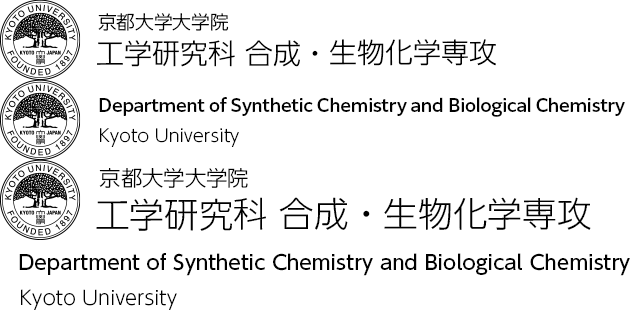Philosophy
The Department of Synthetic Chemistry and Biological Chemistry was established in 1993 for the purpose of "advancing the fundamental and applied science of materials synthesis and biotechnology and the theory of substance conversion, with a focus on the scientific disciplines of synthetic and biological chemistry."
Traditionally, developments in synthetic and biological chemistry have been achieved independently.
The central concern of synthetic chemistry is to examine, from both a theoretical and an empirical perspective, the interrelationships among the structures, properties, and interactions of the molecules that make up materials, and thus to establish guidelines for the rational design of various structures and functions and techniques for efficient synthesis of materials.
The discovery of functional (intelligent) materials, whether for pharmaceuticals or high-density data storage elements, has improved our quality of life enormously and given rise to a new platform for industrial growth. In terms of their structures and functions, molecules and their aggregates offer limitless variation and potential. Thus, for humans, functional materials represent a virtually endless field of exploration.
Biological chemistry, whose key mission is to chemically clarify the structures of substances in relation to their roles in biological phenomena, has contributed greatly to the development of life science and technology.
In recent years the gap between synthetic chemistry and biological chemistry has narrowed considerably.
In synthetic chemistry, a powerful factor behind advances in the observation, modification, analysis, and elucidation of life phenomena has been the recognition that the ultimate model at which to aim-- whether in terms of structure, function, or synthesis --is suitability for application to living matter. In biological chemistry, advances have been driven by synthetic materials with diverse and specific properties, and by molecular design methods.
Historically, the focus of biological research has shifted from the whole to the part (from the individual body to organs, from organs to cells, and from cells to biomolecules)--in other words, there has been a top-down movement in the focus of analysis. Meanwhile, synthetic chemistry techniques have followed a bottom-up evolution, shifting progressively from simple molecules to larger and more complex systems.
The area in which these two fields intersect-- the so-called nano-realm --is one in which the functional elements of living things, such as proteins and nucleic acids, display advanced functions such as physical transformation, electron mobility, energy production, and information processing.
It is no exaggeration to state that the cornerstone of technological innovation, be it in physics, chemistry, or biology, lies in the control of nanoscale phenomena. This explains the importance of nanotechnology and biotechnology, which enables such control, and nano-biotechnology, which integrates these as an interdisciplinary field of science encompassing chemistry and biology.
The purpose of the Department of Synthetic Chemistry and Biological Chemistry is to drive advances in synthetic and biological chemistry through the promotion and application of fundamental science, as well as to establish this interdisciplinary field as a focus of creative chemical biology research.
In addition, as an academic department, we are promoting the development of a comprehensive precision science employing theoretical perspectives based on structure, property, function and system control on all scales (molecular, nano- and bio-scale), and the methodologies of molecular technology, nanotechnology, biotechnology, and nano-biotechnology.
